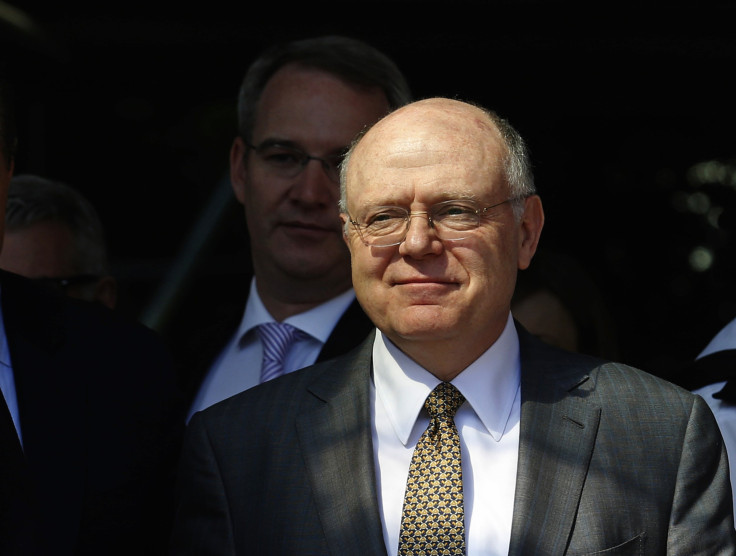Corporate Tax Inversions: Treasury Department’s New Rules Won't Stop Company Deals Designed To Avoid US Taxes

When the U.S. Department of the Treasury released new rules concerning corporate tax inversions Thursday, all eyes settled on Pfizer (NYSE:PFE). The pharmaceutical giant and Viagra maker is in talks to acquire Ireland's Allergan. The move would allow Pfizer to headquarter in low-tax Ireland, relieving the company of what Chief Executive Ian Read has called the “tremendous disadvantage" of U.S. corporate taxes.
The new rules, intended to discourage such arrangements, gave Pfizer's investors pause in after-hours trading. But by midday Friday they were unfazed. Shares of the company were up 14 cents, or 0.4 percent, at noon. (Update: Pfizer ended the day down 0.3 percent.)
Meanwhile, medical-device manufacturer Medtronic -- whose $50 billion purchase of Ireland's Covidien this year ranked as the largest inversion in history -- told investors Friday that the new rules “do not have a material financial impact on the company.”
After two rounds of rule-making designed to stymie inversion deals that ship taxable U.S. corporate profits overseas, companies hoping to continue the practice are largely undeterred. Absent legislation from Congress -- and, some argue, a feistier Treasury Department -- corporate profits won’t stop leaving American shores.
“Treasury was timid here. They pulled their punches,” said Steven Rosenthal, a senior fellow at the Tax Policy Center. As for the big pharmaceutical combination on investors’ minds: “Pfizer-Allergan will move forward notwithstanding yesterday’s rules.”
Treasury Secretary Jacob Lew admitted that the department’s options were limited. “There is only so much the Treasury Department can do to prevent these tax avoidance transactions,” Lew said in a statement regarding the new rules. “Only legislation can decisively stop inversions.”
Matt Gardener, executive director of the Institute on Taxation and Economic Policy, agrees. “It’s only because of the sheer inaction on the congressional front that people are paying attention to this.”
'One Hand Tied Behind Our Back'
Bills introduced in Congress to address inversions have barely budged. Lew has warned that failing to stop the deals could dent the fragile U.S. budget. “If we allow the incentives to pursue these deals to remain in place, we run the risk of undoing the progress we’ve made to reduce our federal budget deficit,” he said earlier this year.
A congressional joint committee estimated that legislation banning inversions would preserve $41 billion in U.S. taxes over a decade. Thirteen tax inversions have taken place since early 2013, according to Dealogic.
For their part, corporations argue that the official U.S. top marginal corporate tax rate of 39 percent, the highest in the developed world, encourages flight abroad. Ian Read, chief executive of Pfizer, said this year that the corporate tax means U.S. companies are competing “with one hand tied behind our back.”
But studies have shown that the effective tax rate big corporations pay is closer to 20 percent after markdowns, depreciation and other deductions come into play.
The new Treasury rules are threefold. First, they disallow two companies, one foreign and one domestic, from forming a new corporation domiciled in a third, separate country. Cyberonics, a formerly Texas-based medical-device maker, took that tack this year in merging with an Italian company to form a new corporation in the U.K.
The second rule prevents companies from inflating a foreign parent corporation’s size to bypass existing rules that prevent foreign mergers with too large a size differential between companies. Finally, the new parent corporation must be an official tax resident of the country where it is located.
Strip Tease
Though limited in its authority, the Treasury Department had given indications that the new rules would address a practice that tax experts have singled out as a major factor in inversion deals: earnings stripping.
“The expectations were that Treasury was going to tackle earnings stripping, which is a prime motivator of these deals,” said Rosenthal, who has made the legal case for the Treasury Department’s ability to address the tax maneuver.
Currently legal, the practice usually involves a corporation’s U.S. arm borrowing money from a foreign parent company or affiliate, then sending large interest payments back overseas. Profits fly abroad in the form of interest, while the American branch can deduct the interest from its U.S. tax liabilities.
“The whole point of earnings stripping is making U.S. profits appear on paper to be earned offshore,” said Gardener, who said there’s already reason to believe U.S. companies are engaging in a similar practice. Pfizer, for instance, has been shipping profits abroad for years, racking up an overseas cash hoard that reportedly tops $50 billion.
The Treasury Department said it was continuing to explore other ways to address inversions, including through limitations on earnings stripping. Rosenthal said that broader rules would make a deeper impact. “If we had a rule that applied more generally, then we would see fewer inversions,” he said.
“If corporations continue to combine with foreign companies, corporate taxes will fall even further,” Rosenthal continued. “And that means more taxes to be paid by the rest of us.”
© Copyright IBTimes 2024. All rights reserved.












